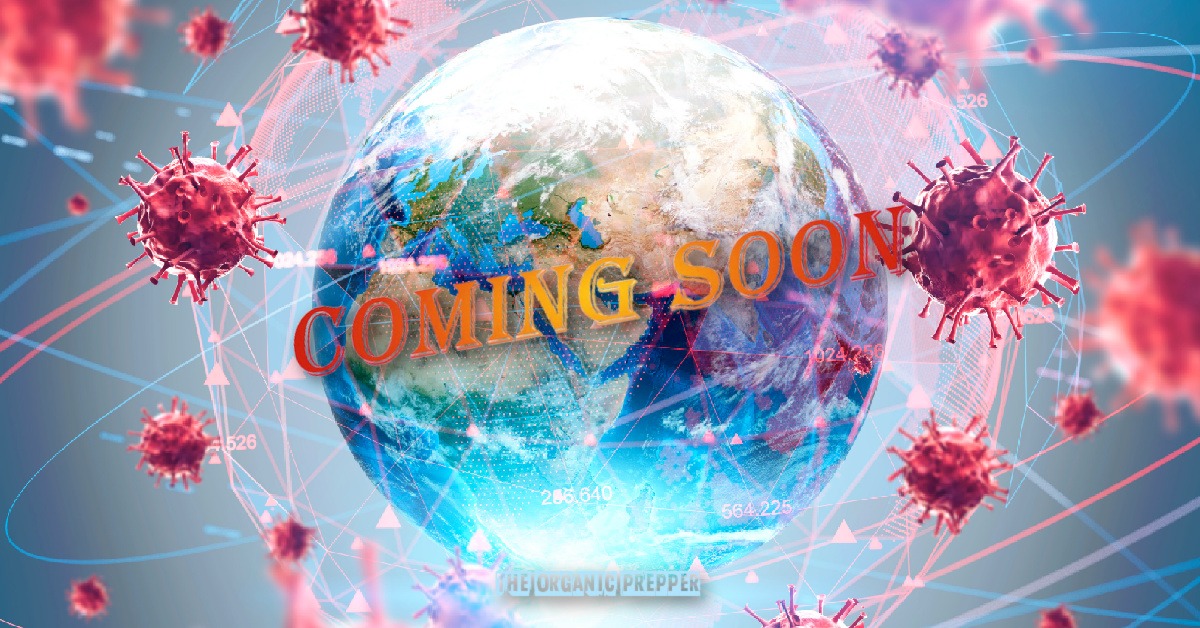Govts Are Preparing for a New Scarier Pandemic


[ad_1]
If you”re new here, you may want to subscribe to my RSS feed. Thanks for visiting!
(Psst: The FTC wants me to remind you that this website contains affiliate links. That means if you make a purchase from a link you click on, I might receive a small commission. This does not increase the price you’ll pay for that item nor does it decrease the awesomeness of the item. ~ Daisy)
Have you heard of the Disease X Act of 2023? I hadn’t, until this week.
In June, a bipartisan bill was introduced to the House of Representatives to develop medical countermeasures for viruses with pandemic potential. Later in June, when the bill was introduced to the Senate, a section had been added suggesting a budget of $40 million per year for 2024 through 2028.
This $40 million annually would be on top of the 5% of our healthcare budget we will be expected to pay the World Health Organization (WHO), assuming the Pandemic Accord passes.
What is Disease X, how likely are we to encounter it, and how concerned should we be?
Back in 2018, the WHO came up with the name “Disease X” as a placeholder for any disease that hadn’t been discovered yet. The name “Disease X” gets thrown around in the press every few years for a few weeks at a time, stirring up fear of the next pandemic. In fact, the New York Times referred to Covid as Disease X in a February 2020 opinion piece.
And while the Disease X Act of 2023 was introduced to Congress quietly over the summer, in the past week, Disease X fearmongering has been everywhere, just in time for the World Economic Forum’s annual meeting in Davos.
On Wednesday, WHO chief Dr. Tedros Ghebreyesus will give a talk at Davos titled “Preparing for Disease X,” in which he will attempt to sell the world on the “novel efforts needed to prepare healthcare systems for the multiple challenges ahead.” This statement is based on the assumption that Disease X will be far deadlier than Covid.
They’ve tied Disease X to climate change.
WEF-affiliated figures like Tedros believe we should be living in fear of new diseases emerging due to climate change. What’s the rationale? As permafrost melts and environments change, animals move around, and new interactions between humans and animals occur. With increasing and varied human-animal interaction, so increases the threat of new diseases.
We’re also supposed to be afraid of diseases mutating within livestock and then jumping to humans. This is actually a real issue. Concentrated animal feeding operations (CAFOS) have been known to spawn various strains of swine and avian flu viruses.
However, make no mistake about it. Proposed measures within the Pandemic Accord will not be about improving animal welfare but about ending livestock agriculture and consolidating the food supply, as we’ve discussed elsewhere.
If this sounds outrageous, look into OneHealth. This refers to the idea that, since the health of humans, animals, and the environment is all interconnected, all sectors need to be looked at in conjunction with each other to address new diseases.
We are all connected. However, by linking animal and environmental health with human health, if the Pandemic Accord is implemented, governments will be able to take action regarding livestock practices if the WHO declares a pandemic. It could also potentially give climate emergencies the same priority as health emergencies.
Again, this may sound far-fetched, but these conclusions have been drawn by people far more intelligent and qualified than I am. In October, Bret Weinstein and Heather Heying, both professors in evolutionary biology, discuss the broader implications of the WHO Pandemic Accord as it relates to OneHealth.
Wait…what about gain-of-function research?
While it should be fairly obvious that any new pandemics will be blamed on zoonotic transmission, just as Covid was, I believe we should be far more concerned about the gain-of-function research that still takes place in laboratories around the world.
Chinese researchers recently developed a form of coronavirus that killed 100% of the mice exposed to it within eight days. When Dr. John Campbell, a trusted British health practitioner, tried to draw attention to this research, YouTube removed his video, as explained by Russell Brand.
The fact that mainstream media is trying to make us afraid of Disease X at the same time they’re trying to cover up gain-of-function research should be all the evidence we need that something nasty is being brewed up for the general population.
Much of what goes on in the press is predictive programming. In March 22, 2018, EcoHealthAlliance posited that Disease X might come from a cave in Guangdong Province. While it’s clear now that COVID came from a laboratory, in 2020 and 2021, groups like the EcoHealthAlliance spent a lot of time and money trying to convince the world that no, seriously, COVID came from bat caves.
And though Covid was not particularly dangerous for young, healthy individuals, Disease X may be more serious. The phrase “20 times deadlier than Covid” has been getting tossed around a lot. I don’t think we should take it lightly.
Three reason the next virus could be more deadly
There are three possible reasons to expect a more lethal virus the next time around, besides the fact that the WHO and WEF keep saying to expect it.
The first possibility is that the Davos-types have been surprised at the amount of pushback they received regarding the Covid response. Many people, even in blue states, have gotten into the habit of ignoring recommendations. Journalists like Matt Orfalea are making sure that the ridiculous things we were supposed to believe during Covid are not getting memory-holed.
While I personally find the amount of peaceful noncompliance inspiring, I also don’t expect the folks at Davos to simply let this slide. The British Covid inquiry has been postponed indefinitely for no clear reason. It wouldn’t surprise me at all if the Davos folks decided to throw something truly miserable our way out of spite. Most of them should be fine. They’ve all got their Doomsday bunkers, as Daisy recently noted.
The second possibility is that Davos believes if Disease X makes enough people seriously ill, the population will beg for the authoritarian controls Davos so wants to implement. I’m not sure how that will work out; I think it depends on how tightly they can control the flow of information. If they can convince enough people that Disease X emerged naturally, maybe average citizens will trust the “experts” enough to let them take the reins.
However, if evidence emerges that Disease X comes from a lab, people are going to be furious. The WEF knows this; it’s not a coincidence that their theme this year is “Rebuilding Trust.”
And the third possibility would be a desire for general mayhem. Many of us have known since 2008 that our financial system is sick and that a crash is inevitable. George Gammon explains here why he thinks the system will crash in March He might get something wrong, but he’s not the only financial analyst anticipating a collapse fairly soon.
Naturally there will be a public uproar whenever that happens. An exotic disease can provide a major distraction.
Diseases = Mayhem
An exotic disease could also distract from the many geopolitical disasters bubbling up around the world. Or it could throw a monkey wrench into the next political cycle. If we have some kind of Cyber 9/11 event, a disease could obscure who’s really behind it.
And that’s the beautiful thing about disease if you want to create mayhem. Diseases just happen. And even if there’s evidence that gain-of-function research is behind new diseases, many people are not scientifically literate enough to seriously question what they are told by the mainstream media.
Thanks to modern sanitation and the availability of antibiotics and many other modern medicines, we should probably be less fearful of disease now than at any other time, simply because we have so many treatment options. And, if we choose to do so, those of us living in countries with access to clean water and adequate food can take pretty good care of ourselves.
However, we have not been told to take care of ourselves in the past few years. We’ve not been told how amazing First World sanitation prevents most of the diseases developing countries still struggle with, such as cholera. We’re not encouraged to get outside, get our Vitamin D, and exercise. We’re not encouraged to eat healthy food. We’re just encouraged to “trust the experts” and continue taking whatever newest pharmaceutical products they recommend.
Don’t live in fear of Disease X. But take care of your health.
I don’t think it’s wise to live in fear of the latest current thing; I do think it’s wise to take care of our own health. I know Daisy’s been happy with the Wellness Company, a business that was created in response to the disaster created within the medical community during COVID madness.
I also think it’s wise to pay attention to what’s going on. I’m going to watch Tedros’ speech when it’s available. I want to know what they have planned.
But I’m also going to plan my garden and continue planning for the future with my kids. Prepping is not about living in fear; it’s about being situationally aware and doing your best with what you have so that you don’t have to be afraid of whatever comes next.
What do you think? Any guesses as to what Disease X will be or how it will begin? Are you expecting another pandemic? How do you plan to handle it this time around? Will you make changes to how you responded the last time?
Let’s discuss it in the comments section.
About Marie Hawthorne
A lover of novels and cultivator of superb apple pie recipes, Marie spends her free time writing about the world around her.
[ad_2]
Source link
Recent Posts
Dear Diary, It’s Me, Jessica: Part 16
[ad_1] If you're new here, you may want to subscribe to my RSS feed. Thanks…
Google Faces Lawsuit After $5M in Crypto Stolen via Play Store App
[ad_1] A Florida woman, Maria Vaca, has sued Google in a California state court, alleging…
All About Water Purification: A Complete Tutorial
[ad_1] You may need to purify water to make it safe to drink. The process…
Protocol Village: Quai Releases Mainnet-Compatible Devnet, Crunch Lab Raises $3.5M
[ad_1] The latest in blockchain tech upgrades, funding announcements and deals. For the period of…
The Grim New Daily Life in Venezuela
[ad_1] If you're new here, you may want to subscribe to my RSS feed. Thanks…
World’s 3rd largest public pension fund buys $34M MicroStrategy shares
[ad_1] The third-largest public pension fund in the world has just bought nearly $34 million…
